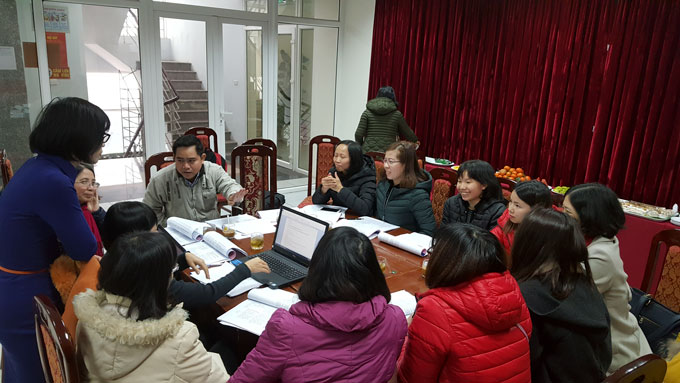To improve, refine, and finalize the draft national framework of environmental education for sustainable development, the Department of Science, Technology and Environment (DSTE) of the Ministry of Education and Training (MOET) together with the Vietnam Institute of Educational Sciences (VNIES) and UNESCO conducted an Education for Sustainable Development (ESD) consultation meeting in the framework of UNESCO project on strengthening ESD policy in Viet Nam, with financial support from the Government of Japan.

Officers from the DSTE, VNIES, other MOET departments, Departments and Bureaus of Education and Training, lecturers from universities and teacher training institutes, teachers and education administrators attended this meeting. In the opening session, Dr. Le Trong Hung, Director General of the DSTE, emphasized the importance of translating ESD principles into the real life and educational activities at schools.
MOET has been developing some key tools to promote ESD in Viet Nam in the framework of UNESCO project. They include the national framework of environmental education for sustainable development that has been drafted by MOET, with technical support from UNESCO and consultants. It is expected that this national framework will help MOET mainstream environmental education into the new curriculum and syllabus. Dr. Hung expressed his hope to have the similar framework for two other key dimensions of ESD, that is, the economic and socio-cultural dimensions.
Mr. Toshiyuki Matsumoto, Education Programme Specialist from UNESCO Ha Noi Office, provided brief information about sustainable development and ESD at the global level in the context of the Millennium Development Goals (MDGs), the United Nations Decade of ESD 2005-2014, the Sustainable Development Goals (SDGs) and the Global Action Programme (GAP) on ESD. He also informed the participants that MOET of Viet Nam is an official member of the Priority Action Area 1: Advancing Policy under the GAP on ESD.
The draft framework of environmental education for sustainable development has been developed based on the findings from the desk review of key policy documents and literature review as well as a national needs assessment survey of environmental education. Around 3,000 teachers and members of the school boards at pre-school, primary, lower secondary and upper secondary education levels were involved in the needs assessment survey. In addition, the draft framework was consulted with officials and experts from MOET and VNIES and teachers and lectures at schools, universities and teacher training institutes.
In the meeting, the expert team reported the process of developing the draft national framework of environmental education. The expert team also presented the details of the draft national framework that contains knowledge, skills and attitudes suitable for each of the four educational levels: pre-school, primary, lower secondary and upper secondary education. Comments and feedbacks from participants will allow DSTE and the expert team to finalize the national framework of environmental education of high quality and realistic use. UNESCO will continue working closely with DSTE.